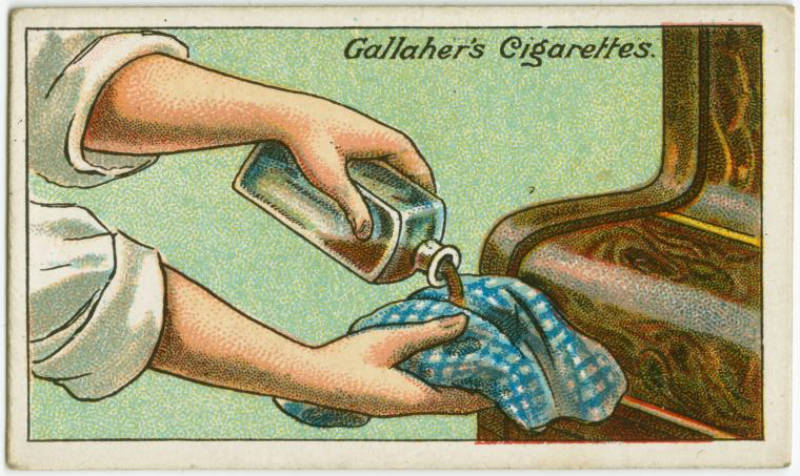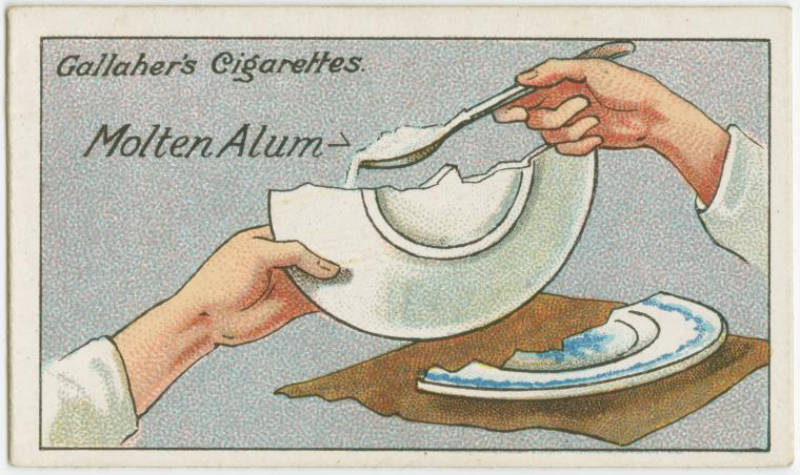Everybody loves life hacks. And how could we not? They’re usually so simple we think “why didn’t I think of that before?” Yet they can sometimes be a little weird, which makes us think… “Wait, does this actually work?”
We’ve already talked about life hacks many times before, but today these are very special life hacks — all of them are from the early 1900s.
Yep, life hacks from over 100 years ago.
These came to the public in the form of small cards tucked inside cigarette packs from the Gallaher company. You can find all of them on the NY Public Library website. Some of them are hideously outdated, and some are even quite dangerous.
But here are some of the most interesting ones, plenty of which are still useful… and some that aren’t.
1. How to detect leaking gas

The original back of this card reads and I quote: “There is always danger in trying to locate an escape of gas with a light.”
Well, you don’t say?
The solution proposed is quite simple: just paint soap solution over the pipe where you suspect is leaking. Bubbles will form and pinpoint the leak spot.
And in case it wasn’t clear — never EVER use light or fire to detect gas leaks. EVER.
2. How to cut new bread in thin slices

It might be slightly outdated, I don’t recall anyone having trouble with cutting bread this way, but it might actually work.
To easily cut thin slices of new bread, plunge the knife into hot water, and when the knife is hot, use it to cut the bread quickly. The hot knife should cut softly. It’s worth a shot!
3. Prevent empty vases from falling over

This is a pretty straightforward tip that you can use.
The idea is to prevent valuable vases from tumbling or being knocked over. The plan is: fill the vase with enough sand for it to gain weight at the base. This should prevent it from tumbling against minor bumps (by children or household pets).
4. Keep flowers fresh for up to a week

The back of the card for this one says the trick is useful for when you want to send flowers over the post for a long journey. How adorable.
Turns out, I found that the flowers actually keep on growing by this method, so it definitely works if you want to keep it fresh for a little longer.
Potatoes are so great. Here’s a dancing potato to celebrate how great they are:

5. Homemade Polish Solution

Nowadays you can always find good polish solution for very cheap, but if you have an unstoppable urge to polish and need some polish right away:
In a bottle, mix equal parts vinegar and paraffin. A few drops of oil of lavender will add a pleasant smell to the mixture, and you can keep it closed for later use as well.
There are MANY different homemade polish solutions out there, some of which include lemon juice. This one seems legit, but we’ve yet to try it for ourselves.
6. Preserve eggs for a long time

This is an ancient tip for preserving food before refrigerators: basically bury your eggs in salt, in a way no air reaches the shells, and keep them in a cool and dry place.
After some quick research, I can confirm that this technique works… but it’s quite unnecessary. It was great for when people didn’t have refrigerators, but ever since pretty much everyone has a functional refrigerator in their house, you’ll probably never need this.
7. Mend broken china

To mend broken china, this card says you can heat common alum in an old iron spoon until it melts, then apply to the broken pieces. Keep them together with a string and let them set.
Once again, nowadays, there are many easier and more reliable alternatives for this, including specific glues for each type of material.
8. Cool wine without ice

Pouring ice in wine is considered a heresy, but people love cold beverages, so this tip involves wrapping a bottle of wine with flannel and placing it under running cold water for about ten minutes. By then, it should be ready for the table.
Today, there’s a much easier and economic way to cool wine. To have the same effect without wasting tons of water, simply freeze a few grapes on your freezer. When serving wine, put two or tree frozen grapes on your glass. It won’t affect the taste of the wine, and it will be cool within seconds.
9. Easily remove a splinter

Anyone please tell me if this works, I’m really curious. Just not curious enough to stick a splinter in my hand to try it.
Basically, fill a small wide-mouthed bottle with hot water and press it against the spot where the splinter is. The suction should pull the flesh, and the steam will slowly draw out the splinter.
If the splinter is not on the exact center of your palm, this may not work as well.
10. Clean the inside of bottles

This might actually be helpful to clean the inside of bottles — since we can’t reach in there normally.
It tells you to add some water and sand inside the bottle, and then shake vigorously. The sand will help clean every little corner in there, and afterwards you can just wash it out.
11. Pick up broken glass safely

I’m guilty of cutting myself more than once with broken glass. It’s always the same: you think “I’ll just be careful” and ten seconds later you have a cut on your finger that will annoy your for days.
This card suggests you use a damp cloth to pick up broken glass — preferably a piece of old cloth you can immediately throw away. It will take up most of the shards easily. It’s certainly safer than trying to pick them up by hand — seriously, never pick them up by hand.
12. Keep the saucepan lid raised

Perhaps there are easier ways to do this, but… it certainly works, and there’s no harm in trying.
Just be sure to use a wooden clothespin, never a plastic one. And also be careful if it has metal parts, since you might burn yourself picking it up.
13. Prevent eye glasses from steaming

Especially during winter, when you’re in and out of places with air conditioning on maximum, steamy glasses can be a nuisance.
Of course this wasn’t exactly the problem they had in the early 1900s, but still.
This card suggest you clean your glasses with a little soap, and polish it well afterwards. An invisible layer of soap will remain and prevent your glasses from steaming.
As someone who wears glasses, I don’t love the idea of having soap that close to my eyes, but… it actually works. So if this happens to you often, it’s worth a shot. Then again, there are many other alternatives, like anti-fog wipes, rain repellent, anti-fog paste or spray… or saliva. Yep.
14. Remove long nails easily

That first pull of a long nail is usually easy, because you can use the surface to help the pull. After a certain height though, it gets harder, since you have no more support to pull.
This tip is as simple as it looks from the image — when the nail is high enough that you need support, place a small block of wood (or anything small and sturdy) to help you out.
15. Wash thin glassware

To wash very thin glasses (or other glassware), dip them sideways on hot water, so most of its surface touches the water at the same time. This will prevent them from cracking.
Did you know about any these life hacks? Tell us about other cool ones and share this with friends!
Follow us on Facebook!
Keep on reading:
8 Genius Food Hacks to Make Life Easier
12 Insanely Clever Organization Hacks To Improve Your Life
9 Useful Life Hacks You Should Know By Now
10 Life Hacks to Make Your Life Way Easier